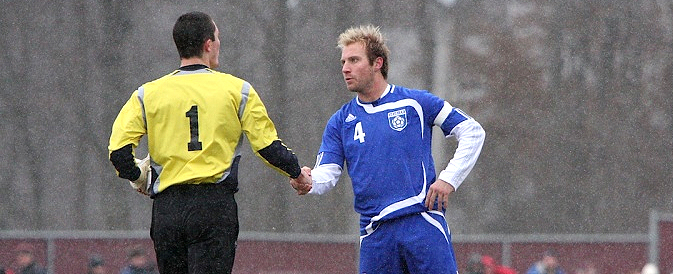Being a Good Sport

Here's a 10-item checklist to follow as you try to develop a habit of good sportsmanship.
1. Abide by the rules of the game.
Part of good sportsmanship is knowing the rules of the game and playing by them. If you decide to play a soccer,
it is your responsibility to learn not only how to play but how to play according to the rules which have been established and standardized to allow competitive games to be played in
an orderly fashion. The more you know the rules the more you can enjoy the sport.
2. Try to avoid arguments.
Part of good sportsmanship is anger management. Arguing with officials, coaches or opponents is often simply a misguided effort at "letting off steam" in the heat of competition. A good sport knows that anger can get in the way of a good performance.
A good sport knows how to walk away from an argument and to stay focused on the game
at hand.
3. Share in the responsibilities of the team.
Good sportsmanship implies that you are a team player. In other words, you understand that your behavior reflects on the team in general. Moreover, a team player does not condone unsportsmanlike conduct from teammates and reminds players that they all share in the responsibility of promoting good sportsmanship.
4. Help lesser talented players.
Good sports, will look out for and encourage the less talented players on the team.
5. I always play fair.
Honesty and integrity should be an integral part of soccer. A player with good sportsmanship does not want a
hollow victory which comes as a result of cheating ("dirty" fouls, ineligible players, performance enhancing drugs, etc.)
6. Follow the directions of the coach.
A player with good sportsmanship listens to and follows the directions of the coach, realizing that each player's decisions affect the rest of the team. If a you have a disagreement with the coach, you should discuss the disagreement privately in a civil manner, away from the public eye.
7. Respect the other team's effort. Whether the other team plays better, or whether they play worse, the
player with good sportsmanship does not use the occasion to put the other team down. In the field of competition respect for opponents is central to good sportsmanship. If an opponent out-performs you, then you accept it, learns from it, offers no excuses and moves on. If you out-perform an opponent, you should enjoy the victory, but does not gloat, do not belittle, and do not minimize the opponent's effort. |
8. Offer encouragement to teammates.
A sign of good sportsmanship is a player who praises teammates when they do well and who comforts and encourages them when they make mistakes. Criticizing teammates in the heat of battle simply distracts from
the focus of working together and gives the advantage to the opponent who develops a sense of confidence when seeing signs of weakness or a lack
of unity in the midst of the competition.
9. Accept the judgment calls of the game officials.
Part of the human condition is making mistakes. Arguing with an official over a judgment call simply wastes
energy. The player with good sportsmanship knows that errors may be made, but the player also knows that a
game is made up of all the plays and calls from the beginning to the end of the game, not just the call in dispute. The player with good sportsmanship may be upset, but that player also has learned to focus his/her energies back on the game and on doing the best he/she can do
for the rest of the game.
10. End the game smoothly. When the game is over, pouting, threatening, cajoling have no place in the life of the players with good sportsmanship, who emphasize the joy of participating, regardless of outcome. They're not devoid of emotions but they know that their efforts to end the competition smoothly, without antagonistic emotional display, will help
ensure that the games will continue in the future. |
Courtesy Dr. Burnett. For a catalog describing all his materials call (800) 493-5943.
|
